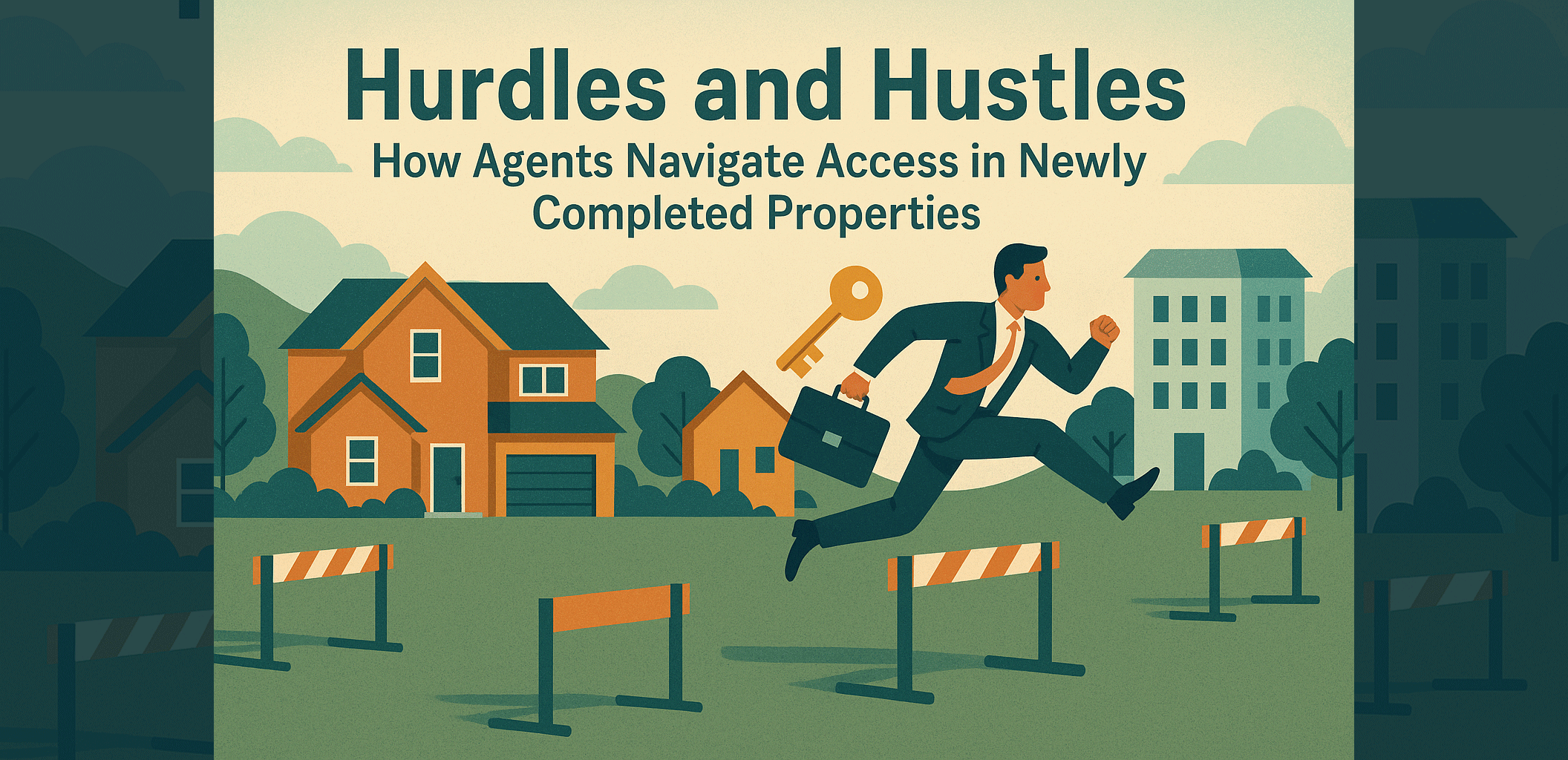Hurdles and Hustles: How Agents Navigate Access in Newly Completed Properties

1. The Reality Behind “Newly Completed” Projects
When a project achieves vacant possession (VP), hundreds of eager buyers, contractors, and service providers rush in at once — all trying to inspect, renovate, or rent out their new homes. For property agents, this is prime time. Every new owner is a potential client: some want to sell, some need tenants, and others seek help managing renovations. But for agents not officially appointed by the developer, just getting inside the development becomes the first major hurdle.
2. The First Hurdle: Entry Restrictions and Security Control
Most developers restrict access to their new projects during the VP period. Only authorized personnel — such as appointed agents, contractors, and maintenance teams — are allowed entry. Unauthorised agents, even with the best intentions, often find themselves:
- Denied entry at the guardhouse,
- Chased away when loitering near the management office, or
- Warned for distributing flyers or waiting for owners in common areas.
From the developer’s perspective, this is about crowd control and liability — too many agents can cause confusion or disrupt defect inspections. From the agent’s perspective, it’s a missed opportunity: hundreds of potential clients are inside, and they can’t even start a conversation.
3. The Second Hurdle: Limited Access Without an Owner or Tenant Pass
Even after the Joint Management Body (JMB) is formed, access remains tightly controlled. Without a resident access card, agents can’t:
- Enter the lift lobby,
- Access upper floors, or
- Escort prospective tenants for unit viewing.
Each attempt requires coordination with owners or management — a slow, inconvenient process that kills spontaneity and efficiency. To overcome this, many agents take a bold step: they become part of the community themselves.
4. The Creative (and Common) Workaround
To secure free access, some agents:
- Rent or buy a unit in the development, effectively becoming legitimate residents.
- Register as tenants under friendly owners to gain an access card.
- Join or get elected into the JMB (Joint Management Body) or even become the Chairman.
This position gives them inside access and the ability to influence how external agents are allowed to operate. It’s a strategic move — but one that comes with moral and professional responsibility.
5. When Access Turns into Influence
While it’s understandable that agents seek access to serve residents better, the line between convenience and conflict of interest can blur quickly. When an agent who is also a JMB member begins to:
- Approve their own agency’s marketing permissions,
- Deny entry to competing agents, or
- Use JMB authority to secure leads exclusively —
…it becomes an ethical concern. Agents in such positions hold dual roles — as service providers and as community representatives. They must separate personal gain from public duty to maintain credibility and avoid disputes.
6. Professional Conduct Comes First
Every agent operating in a new development must remember:
- Access is a privilege, not a right. Developers and JMBs grant it to maintain order, not to create monopolies.
- Transparency is non-negotiable. If you own or rent a unit in the same building, declare it openly.
- Leadership demands neutrality. If you’re part of the JMB, your responsibility is to the community, not to your agency.
Professional agents treat access as a tool for better service — not a weapon to eliminate competition. The best agents win business through trust, consistency, and results — not gatekeeping.
7. The Right Way Forward
Developers can avoid these grey zones by:
- Appointing official agencies during the VP phase to manage key handover, leasing, and resale services.
- Issuing limited-access passes for verified agents with insurance or authorization.
This creates a professional, controlled environment where both developers and agents benefit — and residents enjoy a smoother experience.
Conclusion: From Hurdles to Harmony
Access is the lifeline of every subsale agent. But when it comes to newly completed developments, that access must be earned through trust, structure, and professionalism. Agents who respect boundaries, declare interests, and act ethically can turn restricted access into long-term influence — building genuine relationships that last far beyond the VP period.
Professional Disclaimer
Agents must act professionally and within the limits of their expertise. All renovation, repair, or facility works should be carried out by licensed or qualified contractors, not by agents themselves. When serving as JMB members, agents must maintain neutrality and transparency, declaring all personal or business interests related to the development.











































































































